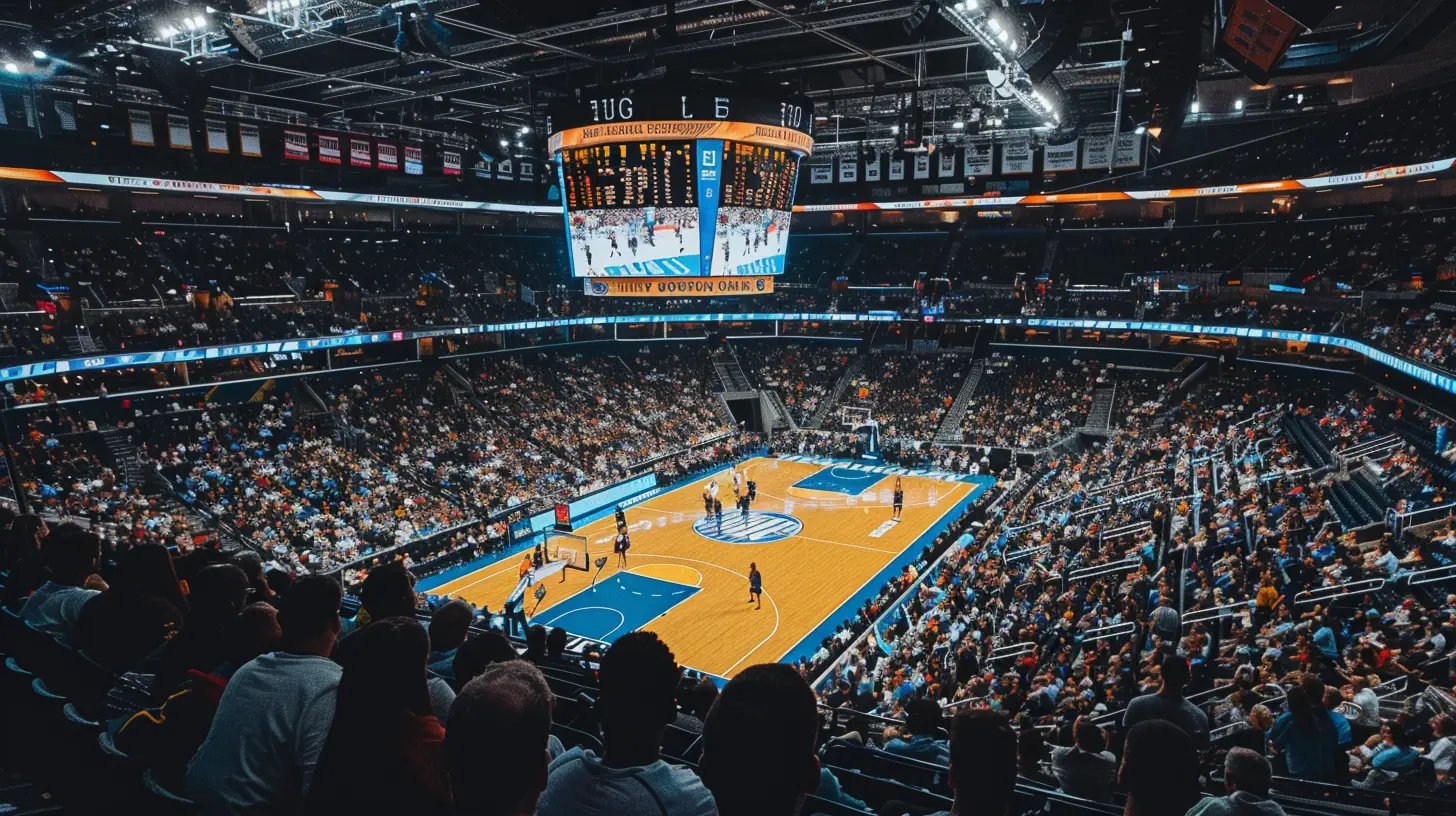The Power of Influencer Marketing in the Sports Industry
10 December 2024
In today’s digital age, influencer marketing has become a crucial tool for many industries, and sports is no exception. Whether you’re a casual fan scrolling through Instagram, a die-hard enthusiast watching a YouTube review of the latest sports gear, or an aspiring athlete following your favorite player on TikTok, chances are you've come across influencer marketing in some form. But what is it about influencer marketing that makes it such a game-changer in the sports industry?
Let’s dive deep into the world of influencer marketing, and why it's reshaping the way sports brands, athletes, and fans interact.

What is Influencer Marketing?
Before we can understand its power, we need to know what influencer marketing is. In simple terms, influencer marketing is a type of marketing that leverages individuals with a significant online presence (influencers) to promote products, services, or brands. These influencers have a loyal following, often in the hundreds of thousands (or even millions), with a high level of engagement on social media platforms like Instagram, Twitter, YouTube, and TikTok.Think of influencers as the modern-day version of word-of-mouth marketing, but with a megaphone. Instead of one person telling their friends about a cool new product, influencers can reach thousands of people in one post or video.
Why Sports and Influencers are a Perfect Match
The sports industry is all about passion. Whether you’re a player, coach, or fan, emotions run high, and loyalty is fierce. Influencers, especially those with a genuine connection to sports, tap into that passion and amplify it. They can bridge the gap between fans and brands, creating a sense of community and authenticity that traditional ads simply can’t achieve.In a world where athletes are considered heroes and sports brands are seen as status symbols, influencers help make the connection between the two. They humanize brands, making them more relatable and accessible to everyday sports enthusiasts.

The Role of Influencers in the Sports Industry
So, how exactly are influencers changing the game for the sports industry? Let’s break it down.1. Building Brand Awareness
The most obvious way influencers help sports brands is by increasing brand awareness. Whether it's a professional athlete endorsing a pair of shoes or a fitness influencer reviewing a new workout supplement, influencers can introduce your brand to audiences you might not have been able to reach on your own.For example, Nike has long partnered with top-tier athletes like LeBron James and Serena Williams to promote their products. These athletes, with their millions of followers, act as powerful marketing tools, bringing the Nike brand to the forefront of fans' minds. However, it's not just about big-name athletes. Micro-influencers (those with smaller, but highly engaged audiences) can also have a massive impact, especially in niche sports markets like rock climbing or CrossFit.
2. Creating Authentic Connections
One of the biggest struggles for brands is creating authentic connections with their audience. Influencers solve this problem. When an influencer promotes a product, it feels more like a recommendation from a friend than a hard sell from a corporation. This is especially important in the sports world, where fans are highly discerning and often resistant to overt advertising.Imagine you’re a budding soccer player, and your favorite YouTuber recommends a specific pair of cleats. You’re more likely to trust their opinion because you’ve followed their journey, watched their videos, and feel connected to them. This trust can lead to higher conversion rates for brands, as fans genuinely believe in the products that influencers promote.
3. Driving Engagement
Social media influencers are experts at driving engagement. They know how to create content that resonates with their followers, encourages comments, and sparks conversations. In the sports industry, this engagement can be incredibly powerful.Take the example of Red Bull. The energy drink company has built a massive following by sponsoring extreme sports events and partnering with athletes who embody their brand's adventurous spirit. Their influencers post jaw-dropping videos of stunts and tricks, racking up millions of views and creating buzz around the brand.
This level of engagement is something that traditional advertising simply can’t replicate. Influencers bring sports brands to life, making them a part of the conversation rather than just another ad in the background.
4. Reaching a Younger Audience
Let’s be real: younger generations are spending less time watching TV and more time on their phones. For brands that want to reach Gen Z and millennials, influencer marketing is essential. According to studies, 70% of teenagers trust influencers more than traditional celebrities.In the sports industry, this is especially important. Sports brands that want to stay relevant need to be where their audience is, and that’s online. Whether it's a TikTok challenge or an Instagram story, influencers are speaking the language of younger fans, and brands that tap into this are positioning themselves for long-term success.
5. Driving Sales and ROI
Of course, all of this buzz and engagement would be meaningless if it didn’t translate into sales. Fortunately, influencer marketing has proven to be highly effective in driving revenue. According to a survey by Mediakix, businesses earned an average of $6.50 for every $1 spent on influencer marketing.For sports brands, this ROI can come in many forms. Whether it’s an increase in ticket sales, more jersey purchases, or higher subscriptions to online fitness programs, influencers can directly impact the bottom line.
6. Humanizing Athletes and Teams
In the age of social media, fans want more than just to watch their favorite athletes play. They want to know them on a personal level. Influencer marketing, especially when athletes themselves take on the role of influencers, allows fans to get a behind-the-scenes look at their lives.Take Cristiano Ronaldo, for example. Not only is he one of the greatest soccer players of all time, but he’s also a savvy influencer. His Instagram account, with over 500 million followers, gives fans a glimpse into his personal life. From family moments to workout routines, Ronaldo has built a brand that goes far beyond the soccer field. This level of connection fosters loyalty among fans and boosts the marketability of both Ronaldo and the brands he partners with.

Types of Influencers in the Sports Industry
When it comes to influencer marketing in the sports industry, not all influencers are created equal. Here are the different types of influencers that brands can work with:1. Athlete Influencers
Athlete influencers are the crown jewels of sports marketing. From LeBron James to Serena Williams, these athletes have millions of followers who hang on their every word. Partnering with athlete influencers can significantly boost a brand’s credibility and exposure. However, these partnerships often come with a hefty price tag.2. Fitness and Lifestyle Influencers
Fitness influencers have exploded in popularity over the past decade. These influencers typically focus on health, fitness, and overall well-being, and they often have dedicated followings. Whether it's promoting a new workout routine, reviewing fitness equipment, or endorsing supplements, fitness influencers can drive significant engagement for brands targeting health-conscious consumers.3. Micro-Influencers
Micro-influencers have smaller followings (usually between 10,000 to 100,000 followers), but what they lack in reach, they make up for in engagement. These influencers are often highly specialized, focusing on niche sports like skateboarding or long-distance running. They may not have the celebrity status of a professional athlete, but their authenticity and connection with their audience can lead to higher trust and better results.4. Sports Enthusiasts and Bloggers
Sports bloggers, podcasters, and analysts also play a role in influencer marketing. These influencers may not be athletes themselves, but they have a deep knowledge of the sport and are respected by fans for their insights. Partnering with these influencers can help brands build authority and credibility in the sports space.
Challenges of Influencer Marketing in Sports
While influencer marketing in sports offers many opportunities, it’s not without challenges.1. Authenticity Concerns
Fans can sniff out inauthenticity from a mile away. If an influencer promotes a product that they don’t genuinely believe in, it can backfire, damaging both the influencer’s reputation and the brand’s image.2. Oversaturation
With so many influencers promoting products, it can be hard for brands to stand out. Oversaturation can lead to diminished returns, as fans become fatigued by constant promotions.3. Cost
Partnering with top-tier influencers, especially athletes, can be expensive. Brands need to carefully weigh the potential return on investment before committing to these partnerships.Conclusion
There’s no denying it: influencer marketing is here to stay, and the sports industry is reaping the benefits. From building brand awareness to driving sales, influencers have proven to be an invaluable tool for sports brands looking to connect with their audience in a meaningful way.However, like any marketing strategy, it’s crucial to approach influencer marketing with a clear plan and an understanding of the challenges involved. By partnering with the right influencers and focusing on authenticity, sports brands can tap into the immense power of influencer marketing and take their game to the next level.
all images in this post were generated using AI tools
Category:
Sports MarketingAuthor:

Onyx Frye
Discussion
rate this article
17 comments
Murphy Reilly
Absolutely loved this article! It’s fascinating how influencer marketing is changing the game in sports. Engaging with fans on a personal level really makes a difference!
February 3, 2025 at 4:27 AM

Onyx Frye
Thank you! I'm glad you enjoyed the article. It's exciting to see how influencer marketing is reshaping fan engagement in sports!
Molly Warner
Who knew that a cat in a sports jersey could sell more jerseys than a championship player? Influencer marketing in sports is like a game of dodgeball—unexpected moves and viral catches can turn the tide faster than a last-minute goal. Meow-some, right?
January 28, 2025 at 5:34 AM

Onyx Frye
Absolutely! It's fascinating how influencer marketing, even with a playful twist like a cat in a jersey, can dramatically shift consumer interest and engagement in sports. The unpredictability adds to its charm!
Gabriel McTigue
Influencers ignite passions, weaving dreams into the fabric of sport.
January 23, 2025 at 3:39 AM

Onyx Frye
Thank you! Influencers indeed play a vital role in connecting fans with their passions and enhancing the emotional experience of sports.
Xylo McGarvey
Who knew athletes could sell more than just wins and jerseys?
January 15, 2025 at 12:40 PM

Onyx Frye
Indeed, athletes leverage their influence to drive brand partnerships and connect with fans on a deeper level, transcending traditional sales.
Mitchell Lawson
Intriguing insights! How do you think the rise of micro-influencers will impact fan engagement in sports? It’s fascinating to see how digital influence reshapes traditional marketing strategies in this industry!
January 11, 2025 at 11:50 AM

Onyx Frye
Thank you! Micro-influencers can create more authentic connections with fans, leading to deeper engagement and loyalty. Their niche audiences allow for targeted marketing that resonates better than traditional strategies, ultimately enhancing fan experiences in sports.
Lira McCarty
Great insights on the impact of influencer marketing in sports! This strategy not only enhances brand visibility but also fosters authentic connections with fans. It will be interesting to see how this trend evolves and shapes future marketing approaches in the industry.
January 7, 2025 at 11:30 AM

Onyx Frye
Thank you! I'm glad you found the insights valuable. It will indeed be exciting to watch the evolution of influencer marketing in sports.
Zephyrion Beck
This article brilliantly highlights how influencer marketing is reshaping the sports industry. By leveraging the passionate voices of athletes and fans alike, brands can engage younger audiences more effectively. It's fascinating to see how social media transforms traditional marketing strategies, creating authentic connections between sports and fans.
January 3, 2025 at 7:58 PM

Onyx Frye
Thank you for your thoughtful comment! I'm glad you found the article insightful. The shift in marketing strategies through social media is indeed reshaping how brands connect with fans and athletes.
Caelum Simmons
In the arena where athletes shine, Influencers weave narratives divine. With passion, they spark brand alliances, Transforming fans into vibrant silences. In this game, every voice ignites, Creating connections that soar to new heights.
December 30, 2024 at 4:49 AM

Onyx Frye
Thank you for your insightful comment! You've beautifully captured the essence of how influencers elevate the sports experience by forging deep connections and enhancing brand narratives.
Seth Rivera
Influencer marketing is revolutionizing the sports industry, and it’s about time we embrace it fully. Athletes are not just players; they're brands. This shift creates dynamic connections between them and fans, driving engagement and revenue. It's not just a trend—it's the future of sports promotion.
December 26, 2024 at 4:49 AM

Onyx Frye
Absolutely! Influencer marketing is indeed transforming the sports landscape, allowing athletes to leverage their personal brands for deeper fan engagement and increased revenue. Embracing this shift is essential for the future of sports promotion.
Damian Simmons
Great insights on how influencer marketing is transforming the sports landscape! It's inspiring to see how athletes and brands can connect with fans on a deeper level. Keep up the fantastic work!
December 20, 2024 at 11:29 AM

Onyx Frye
Thank you! I appreciate your feedback and am glad you found the insights valuable. Exciting times ahead for sports and influencer marketing!
Jessamine McCartney
Influencer marketing transforms fan engagement and boosts brand loyalty effectively.
December 14, 2024 at 3:45 AM

Onyx Frye
Absolutely! Influencer marketing fosters authentic connections between fans and brands, driving deeper engagement and loyalty in the sports industry.
Jillian McGovern
Who knew that dribbling a basketball and posting on Instagram could score you more points than a three-pointer? Welcome to the era where likes outrank layups!
December 12, 2024 at 12:45 PM

Onyx Frye
Absolutely! Influencer marketing has transformed the sports landscape, proving that social media engagement can be just as impactful as traditional athletic achievements.
Zinnia Adams
Influencer marketing in sports: because who needs talent when you can just post a killer selfie? Let’s face it, we’re more interested in their abs than their stats. Welcome to the age of glam over game!
December 12, 2024 at 5:37 AM

Onyx Frye
While influencer marketing does emphasize personality and appearance, it can also effectively engage fans and enhance brand loyalty, bridging the gap between sports and lifestyle. Balancing glam with genuine talent can create a more dynamic and appealing sports culture.
Bianca Thornton
Influencers ignite passion, elevating sports to new heights!
December 11, 2024 at 9:53 PM

Onyx Frye
Thank you! Influencers indeed play a crucial role in amplifying engagement and enthusiasm within the sports community.
Fiona Gill
Influencer marketing in sports is like a winning playbook—strategic, impactful, and game-changing. It bridges athletes with fans, turning fleeting moments into lasting connections. In the digital arena, the right influencer can score big for brands.
December 10, 2024 at 9:48 PM

Onyx Frye
Thank you for your insights! I completely agree—strategic influencer partnerships can truly enhance the connection between athletes and fans, driving significant impact for brands in the sports industry.
Rylan Reese
Influencer marketing in sports transcends traditional advertising, fostering authentic connections between athletes and fans. This approach not only drives engagement but also shapes brand loyalty, revolutionizing how we experience sports.
December 10, 2024 at 12:11 PM

Onyx Frye
Thank you for your insightful comment! I completely agree that influencer marketing bridges the gap between athletes and fans, creating meaningful connections that enhance brand loyalty and transform the sports experience.
Sadie Vasquez
This article brilliantly captures the transformative impact of influencer marketing in sports. It’s incredible how athletes and influencers connect with fans on a personal level, fostering community and engagement. This synergy not only enhances brand loyalty but also enriches the overall sports experience for everyone involved.
December 10, 2024 at 3:42 AM

Onyx Frye
Thank you! I'm glad you found the article insightful. The connection between athletes, influencers, and fans truly is transformative for the sports experience.
MORE POSTS

Beyond the Finish Line: Athletes Who Dared to Dream Bigger

How VAR Has Changed the Face of Football

Understanding Boxing Scoring: How Judges See the Fight

How Mental Health Awareness is Changing the Conversation in Professional Sports

The Economics of Hosting the Olympics: Is It Worth It?

Scouting Report: Future Stars in the Draft Pool

The Role of Sports Technology in Maximizing Athletic Performance

How to Maintain and Repair Your Surfboard

The Future of Extreme Sports in the Olympics

The Best Boxing Training Routines for Beginners

Is There a Safe Way to Enhance Performance Without Doping?